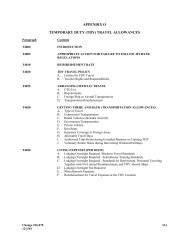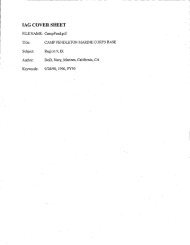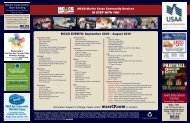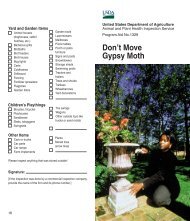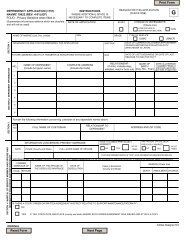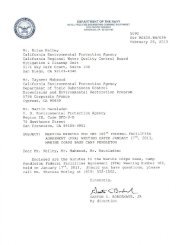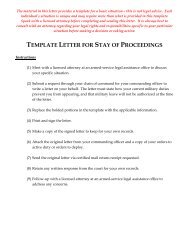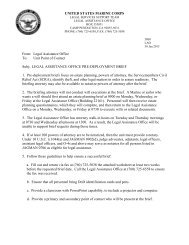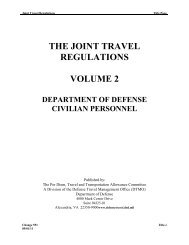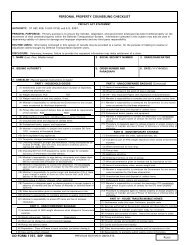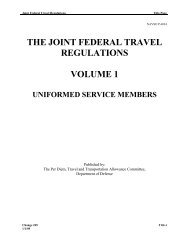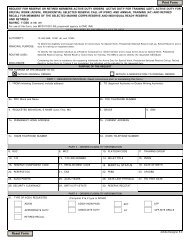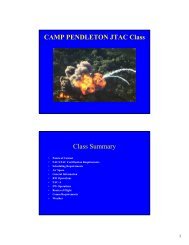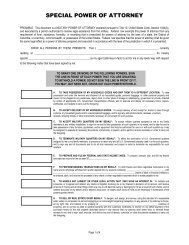bo 3500.1n - Marine Corps Base Camp Pendleton
bo 3500.1n - Marine Corps Base Camp Pendleton
bo 3500.1n - Marine Corps Base Camp Pendleton
Create successful ePaper yourself
Turn your PDF publications into a flip-book with our unique Google optimized e-Paper software.
BO 3500.1N<br />
25 Mar 08<br />
2. Other restrictions. Specific operational restrictions for sensitive<br />
areas are delineated in paragraph 2007 in this Chapter.<br />
2003. POLICE OF RANGES AND TRAINING AREAS<br />
1. General. Police of ranges and training areas is the responsibility of<br />
the using unit. It is the responsibility of the OIC/RSO to ensure ranges,<br />
training facilities, and training areas used by their units have been<br />
properly policed. All solid waste brought to ranges, training facilities,<br />
and training areas; including card<strong>bo</strong>ard, wrapping materials, food waste,<br />
communication wire, expended brass, and ammunition containers, shall be<br />
removed from those areas and recycled or disposed of in approved containers<br />
(i.e., “dumpsters”) or established landfills. No unit will depart their<br />
training location until that area is in a proper state of police. An<br />
inspection by a <strong>Camp</strong> <strong>Pendleton</strong> Range Safety Specialist may be required prior<br />
to departure.<br />
2. Dumpsters. Dumpsters are not provided and are not authorized at ranges<br />
or training areas.<br />
3. Hazardous Material. Hazardous materials (HAZMAT) (e.g., weapons cleaning<br />
gear, paint, POLs, etc.) used while training shall be stored in approved,<br />
closed, leak-proof containers. All HAZMAT shall be clearly marked, identifying<br />
the contents of the container. All HAZMAT spills shall be reported<br />
immediately to LONGRIFLE, who will notify the <strong>Base</strong> Fire Department and the<br />
AC/S, ES (HAZMAT). Units shall use available resources to prevent and<br />
contain spills, at or near the source of the spill, and submit required<br />
formal spill reports to the AC/S, ES.<br />
2004. FIELD HEADS, URINALS, AND WASTEWATER<br />
1. General. Any organization assigned to a range and/or training area shall<br />
properly police heads in their assigned area. Trash will not be disposed of<br />
in any head, urinal, or chemical toilet.<br />
2. Chemical Heads. Platoon size or larger units, and stationary units,<br />
shall use chemical heads. Chemical heads may be coordinated through <strong>Base</strong><br />
Property (760)725-4532. Users shall also coordinate the planned location of<br />
heads via the Range Scheduling Office prior to placement. This ensures<br />
chemical heads will be clear of surface danger zones. As a last resort,<br />
squad size or smaller units maneuvering alone may use properly constructed<br />
straddle-trenches or cat holes to dispose of solid human waste. However,<br />
they shall not be constructed/dug in or adjacent to watercourses. For safety<br />
reasons, before using urinals and/or chemical heads, check them for poisonous<br />
insects and other hazards.<br />
3. Showers. Wastewater from temporary showers (grey water) may be discharged<br />
to land if a local permit is obtained through the AC/S, ES. Provisions<br />
shall be made to ensure that all discharged grey water percolates at<br />
the discharge site; and does not flow to surface waters or dry watercourses.<br />
All grey water disposal shall comply with Preventive Medicine regulations and<br />
standards for military field operations.<br />
2005. FIELD DRINKING WATER SUPPLY<br />
1. General. All connections to the water system shall be attached in such a<br />
manner as to prevent cross-connections and back siphoning from a contaminated<br />
2-3



